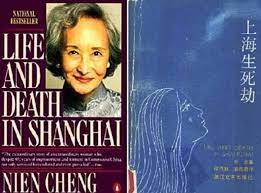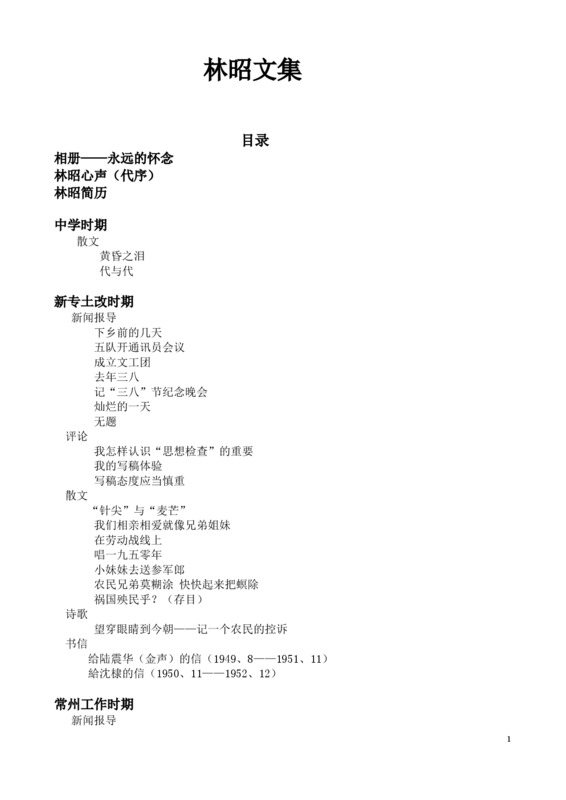Explore the collection
Showing 10 items in the collection
10 items
Book
Experience: My 1957
Born in 1932, He Fengming and her husband Wang Jingchao were both labeled "rightists" during their work at the Gansu Daily Newspaper. In late April 1958, they were sent down to work at the Anxi Farm in Jiuquan. Her husband was sent to the famed Jibiangou Farm, where he died of starvation during the famine of 1960, but she survived. In order to refuse to forget, she spent ten years writing a 400,000-dollar self-narrative, *Experience - My 1957*. The book was published by Dunhuang Literary Publishing House in 2001.
Book
Free Zhang Zhan
Zhang Zhan, born in 1983, is a Chinese lawyer and a dissident of the Communist Party system. In early February 2020, she rushed from Shanghai to Wuhan, which was under lockdown due to the COVID-19 epidemic, to conduct on-the-spot interviews and released a series of video reports on Wuhan's lockdown. More than three months later, she was arrested by Chinese police for "picking quarrels and provoking trouble" and taken to Shanghai for detention.
In December 2020, she was sentenced to four years in prison for picking quarrels and provoking trouble. Zhang Zhan went on hunger strike in the detention center and prison, and there were reports that he was critically ill several times. Her courage and resistance attracted the attention of the international community.
The book *Free Zhang Zhan* was edited and created by Wang Jianhong, the head of the "Zhang Zhan Concern Group" on the Internet. It brings together Zhang Zhan's articles and self-media posts published on the Internet, as well as interviews of Zhang Zhan before she lost her freedom, and interviews, as well as poems and articles from outsiders supporting Zhang Zhan. The book reviews the course of Zhang Zhan's case, Zhang Zhan's struggle in prison and the repercussions it aroused at home and abroad. It was published on May 13, 2024 when Zhang Zhan was released from prison after serving her sentence.
This book preserves and records the history of Wuhan's lockdown in China due to the COVID-19 epidemic. Nowadays, Zhang Zhan's articles and words of support for her have been censored and blocked in China, which makes the book even more precious.
Book
Gan Cui: The Soul of Peking University-From Lin Zhao to the 1989 Democracy Movement
This book was originally published in the series *Micro Traces of the Past* - Documentary Volume - No. 6, edited by Huang Heqing, founded in 2007. Gan Cui, a student at Renmin University of China, was classified as a rightist in 1957. He became lovers with Lin Zhao, a rightist student who came from Peking University to work in the data room. Gan Cui was later sent to Xinjiang. When he returned, he learned that Lin Zhao had been killed. This book (in 140,000 words) is a manuscript of Gan Cui's memories of Lin Zhao in the context of the 1989 pro-democracy movement.
Book
Holy Virgin on the Altar - A Biography of Lin Zhao, The
This book is a biography of Lin Zhao written by mainland writer Zhao Rui and published by Taiwan's Xiuwei Information Publishing House in 2008. The book describes Lin Zhao's life and family background in detail. The "Appendix" contains the recollections of several people involved.Purchase link: https://www.books.com.tw/products/0010431680.
Book
Life and Death In Shanghai
"Life and Death In Shanghai" (also known as "Shen Jiang Meng Hui") is an autobiography by female writer Zheng Nian. First published in English in 1986, it was subsequently translated into various languages and published in various countries. In the book, Zheng Nian recounts her personal experiences from the beginning of the Cultural Revolution to her departure from China in the early 1980s. After her release from prison in 1973, she learned that, shortly after her imprisonment, her only daughter, Zheng Meiping, had been persecuted and had died. She then tried to find out the cause of her daughter's death. The book traces how the ideals of intellectuals were crushed by politics.
Book
Lin Zhao Anthology
The Lin Zhao Anthology contains nearly one hundred of Lin Zhao's works, including essays, poems, commentaries, and news reports written since her middle school years, as well as all of Lin Zhao's manuscripts and letters that were written in prison and later returned to her family. The collection was edited and compiled by Lin Zhao's friends Tan Chanxue (see separate entry) and Ni Jingxiong, and printed into a book on their own. Most of Lin Zhao’s manuscripts written in her blood in prison were typed on computer by Tan Chanxue. This anthology is the most important historical material used by Prof. Lian Xi of Duke University for his research and writing of the book "Blood Letters: The Untold Story of Lin Zhao, a Martyr in Mao's China."
Book
Lin Zhao: No Longer Forgotten
This book contains a number of articles in memory of Lin Zhao. It concerns the death of Lin Zhao as well as Lin Zhao's love, pursuits, and disillusionment. This book was published by Changjiang Literature and Art Publishing House in 2000.
Book
My Mother :Gao Yaojie
Author Eva writes about her relationship with Gao Yaojie, a Chinese doctor. Dr. Gao Yaojie, who was severely repressed by the Chinese government for exposing the mass infection of Chinese farmers in Henan Province, China, by selling their blood, had no choice but to leave China at the age of 78 and go into exile in the United States. The dissemination of her story is strictly forbidden in China. In this book, author Eva describes Gao Yaojie's noble heart, her story, and her experiences.
Book
Sparks: A Chronicle of the Rightist Counter-Revolutionary Group at Lanzhou University
During the worst years of the 1960 famine, a group of teachers and students at Lanzhou University decided to publish an underground publication, <i>Spark</i>, to alert Chinese people to the growing disaster and expose the authoritarianism of the Chinese Communist Party. Only two issues of this underground publication were printed before it was broken up as a counter-revolutionary group case and 43 people were arrested.
The author of this book, Tan Chanxue, was a key participant and helped save the memory of <i>Spark</i> from being lost. Tan was the girlfriend of Zhang Chunyuan, the magazine's founder, and participated in key moments of the magazine's short lifespan. She was sentenced to 14 years in prison, but was later released and rehabilitated, and taught at the Jiuquan Teachers' Training School. In 1982, she was transferred to the Dunhuang Research Institute as an associate researcher, and retired in 1998, settling in Shanghai.
It is largely through Tan's efforts that we know about <i>Spark</i>. She was able to look into her personnel file (<i>dang'an</i>), where she discovered the issues of the magazine, as well as confessions of the people arrested, and even her love letters to Zhang. She photographed this material and later it was turned into PDFs, which circulated around China starting in the late 1990s, helping to inspire books and movies.
Book
The Goddess of Freedom of the Chinese Nation -- An Anthology of Essays in Honor of Lin Zhao 40 Years After Her Death
Lin Zhao, formerly known as Peng Lingzhao, a native of Suzhou, was admitted to the journalism department of Peking University in 1954, but was classified as a Rightist in 1957. She was arrested and imprisoned in October 1960 because of her involvement with the underground magazine <i>Spark</i>. In 1965, Lin Zhao was sentenced to 20 years' imprisonment for "counter-revolutionary crimes." On April 29, 1968, she was sentenced to death and executed on the same day at the age of 36. This book is a collection of more than sixty articles written in memory of Lin Zhao.









